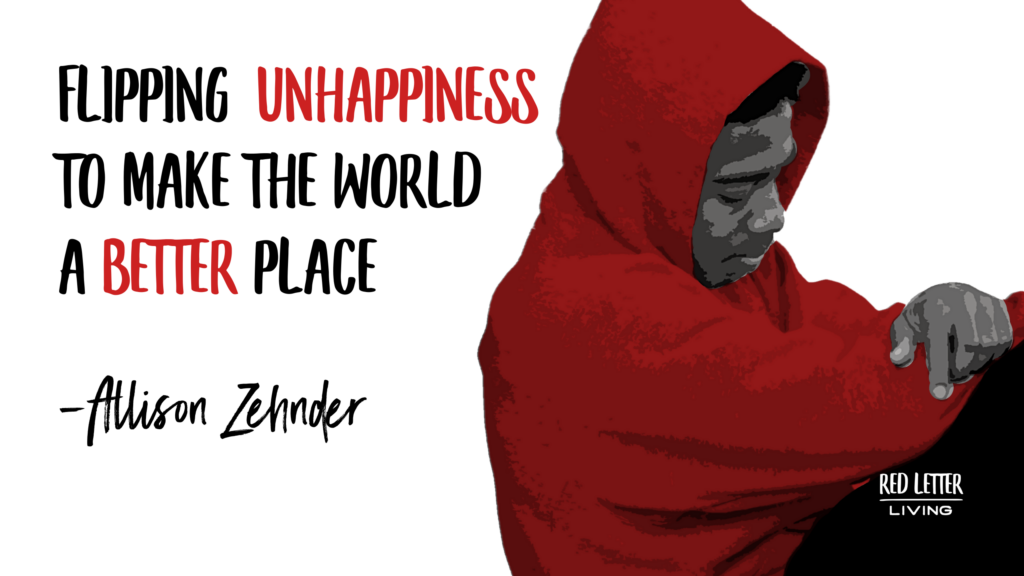

“If you really want to make a friend, go to someone’s house and eat with him…the people who give you their food give you their heart.”
-César Chavéz
When I read that overall levels of happiness among teens are a record-low, my initial reaction is disappointment. That response is normal considering that happiness and comfort in life are the bars we set not only for our kids but ourselves as well. A recent article in the Wall Street Journal confirms that an overwhelming share of Americans aren’t confident that their children’s lives will be better than their own. In this blog, I want to attempt to identify what the problem is in our kids’ lives, how we have contributed to that problem, and why serving is the solution to flipping unhappiness.
First, what’s missing in our kids’ lives? Certainly not knowledge. In a recent podcast, we interviewed Stuart Hall who said, “ The next generation is the smartest, most educated generation in our country.” (For more on that podcast, click here.)
It’s also not comfort. We have more material wealth, better information in our medical fields, and more entertainment opportunities than ever before.
We have more access to people than ever before. Reality TV combs the country for outlier personalities to stick together on an island and watch what they will do. Diversity and inclusion are discussed more than they ever have. Kids today are exposed to a greater variety of people groups than at any time in history.
So if we know more than ever before, if we are more comfortable, and have more access to people, what is the problem?
I believe the reason for the unhappiness is ourselves. As a whole, we are pretty self-absorbed, lack a community, and forget to live for something greater outside ourselves. While researching for our upcoming books, Serving Challenge and Serving Challenge Kids, we found that people who served were overwhelmingly content. If this is the case, serving others might be the biggest factor in increased meaning, purpose, and happiness in our lives.
A great example of this is a young man named César Chávez. César didn’t have an easy life; it was full of suffering. But what is worth studying is what he did with that suffering.
When he was a young boy, César’s family lost their farm because of the Great Depression and moved to California to become migrant workers. Because his family moved around so much, César attended sixty-five schools. This adds up to an average of more than five moves each year. Cesar grew up speaking Spanish in his home and as a result, he was punished when he couldn’t speak English properly at school. At age fifteen, he quit school to take care of his family because his father got hurt.
So let’s look at what this kid was handed:
Just one of these is enough to affect the happiness of anyone. But César didn’t try to move on or forget his troubles. He used them.
When César grew up, he remembered how unfairly farm workers were treated. Even though César was shy, he spoke out and urged other poor farmers to vote. He also fought to make sure they were treated better. At the time grape pickers earned only one dollar per hour. César started the United Farm Workers Organizing Committee (UFWOC) and in an attempt to get the attention needed to spread the word, made the drastic choice to not eat until farmers treated their workers better.
It worked! Farmers began to pay their workers more money. Senator Robert F. Kennedy flew across the country to give César his first piece of bread to break his fast! Later, César fasted again to help improve the chemicals sprayed on the plants to keep the workers from getting sick. When César died, President Bill Clinton gave his wife the Presidential Medal of Freedom.
César wanted to serve the migrant workers of California because He knew what life was like for them. He had lived it himself! Instead of getting angry at the farmers, he decided to get their attention and work his entire life to make sure others were treated better than he was. César Chavez served others his entire life. He said,
César knew there was a difference between serving and being a servant. Serving is something you do now and then. But being a servant is something deeper; it is a continuous attitude of giving and helping.
A crucial piece of this story is César’s faith. Knowing that Jesus suffered for him helped him to be willing to suffer for others. Mark 10:45 says, “For even the Son of Man did not come to be served but to serve and to give his life as a ransom for many.”
César fasted to protest the terrible work conditions of farm workers. He gave up eating until the workers were treated better. While fasting is a way to retreat and connect with God, the opposite is also true.
Food also helps us connect with others. Sharing a meal with our family, friends, or the community is a way to connect with someone outside yourself. It is one way people tell others they care about them. Jesus showed sinners He cared about them by eating with them—even though not everyone agreed with his tactics. One meal can change everything. For example, Jesus changed Zacchaeus’s life forever just by sharing a meal with him.
Sharing a meal was so important to Jesus that He spent His final hours eating and drinking with His disciples. Millions of Christians continue to participate in a meal every Sunday, sharing Christ’s body and blood in the bread and wine, as a way to take part in a kingdom that will someday be our everyday reality.
That unhappiness isn’t just isolated to teens. Before we go pointing fingers, we need to take a long look in the mirror ourselves. Why is it that we think life is going to be worse for the next generation? Could it be that we have grabbed more than we should? Have we worked more than we should? Have we complained and criticized more than we should? With that kind of a setup, it’s no wonder our teens are full of unhappiness. It’s what we’ve handed them, wrapped up nicely in a bow.
I believe it is the unhappiness, not the happiness, that is the catalyst for movement, change, and action. Rather than doing everything we can to boost happiness, what if we used that unhappiness as a starting point? What needs to move in your life? Where can we encourage our teens to think of others? To participate in something greater than themselves? It can start at our own tables. Share meals together. Divide up chores and have everyone participate in the making and cleaning up of the meal. Something as little as loading the dishwasher creates an environment where teens are pulled outside themselves and practice serving.
Will they grumble along the way? They might. But it’s a step towards less self-focused action and more inner peace. I want to see that WSJ trend change. Let’s have so much excitement and hope for this future generation. They are amazing, intelligent, quick, and compassionate. They are welcoming of differences and embrace those who are hurting.
Serving others is the key to a content and fulfilled life. You don’t need to be a hero, you’ve already got one in Jesus.
Challenge: Your challenge today is to flip your routine. One way to do this is to share as many meals as a family as you can this week. Something as simple as eating with others is a way to serve each other. By doing this we will flip unhappiness on its head and find contentment.
